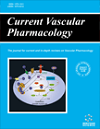-
s Vitamin D and Stroke: Promise for Prevention and Better Outcome
- Source: Current Vascular Pharmacology, Volume 12, Issue 1, Jan 2014, p. 117 - 124
-
- 01 Jan 2014
Abstract
The role of vitamin D (VitD) has recently been expanded beyond bone homeostasis and regulation of calcium levels. VitD deficiency has been proposed as a new risk factor for cardiovascular disease, including stroke. Low 25(OH)VitD levels are very common among post-stroke patients, probably due to their limited mobility and decreased sunlight exposure along with a higher prevalence of malnutrition, and they have been associated with previous and incident cerebrovascular events. Contributing mechanisms have been linked to the association of VitD deficiency with the presence of hypertension, diabetes mellitus and atherosclerosis. Moreover, there is experimental evidence demonstrating that VitD exerts neuroprotective effects, such as stimulation of neurotrophic factors, quenching of oxidative hyperactivity and regulation of neuronal death, as well as antithrombotic properties. It is plausible that VitD supplementation could be a beneficial intervention for the prevention and/or treatment of cerebrovascular disease possibly by decreasing the aforementioned cerebrovascular risk factors and simultaneously by improving neurologic and cognitive functions, thereby reducing falls and fractures in post-stroke patients. However, study results are still conflicting and data from large, randomized clinical trials are needed to clarify these speculations.


